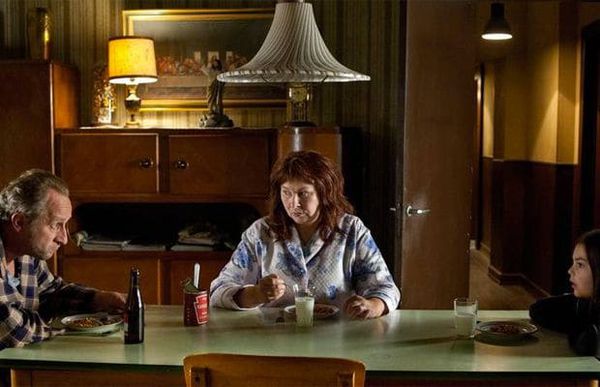Eye For Film >> Movies >> The Brand New Testament (2015) Film Review
The Brand New Testament
Reviewed by: Luke Shaw

“What if God was one of us
Just a slob like one of us
Just a stranger on the bus
Trying to make His way home?”
Is the most memorable and quoted verse from Joan Osborne’s only charting hit, One Of Us, released in 1995, possibly a stealthy inspiration for Jaco Van Dormael and Thomas Gunzig’s interpretation of God for The Brand New Testament? In their vision, God is not only a slob but an indignant buffoon who has decided to spend the rest of His years coding Universal Laws of Annoyance into His rickety old PC, which controls life, the universe and, presumably, everything. Such laws include: “The prefect amount of time in bed is always ten minutes more,” and “the other line at the till always moves faster”. Benoît Poelvoorde is on fine, slobbish form as this most ignoble of deities, and His pettiness is more than convincing as He churlishly retorts “I didn’t say that” to a priest who tries to convince Him that God once said “love thy neighbour”.

How exactly is it that God finds Himself on Earth? Well, He’s on the hunt for His daughter, Ea (Pili Groyne), who has defied Him to write her own Brand New Testament. Urged on by her brother, JC, she uses God’s own computer to deliver the death-dates of all people on Earth to their mobile phones and then sneaks out of their dingy Brussels based apartment to find six more disciples to help her write it. Why six more? Well, that’s because her mute mother is an avid fan of baseball, so JC reckons 18 is probably a better number than 12.
The whimsy doesn’t end there, with each of the film's episodes introducing one of the new disciples, freshly plucked from the off-cuts of Wes Anderson scripts. There’s Avrile, the ravishingly beautiful loner who sports a prosthetic arm due to a tragic subway train accident; Marc, the sex maniac whose life is a constant battle against impulses formulated by a vision in a turquoise two piece during his youth; and Willy, the young boy who decides to spend the last few weeks of his life as a girl.
The levels of twee are fairly high, and contrasted with the bizarre and often regressive gendered comedy it’s likely to divide audiences right down the middle. There are certain scenes that are quite touching, despite their sugariness: Ea and her scribe Victor (Marco Lorenzini) coax flippant philosophy out of the disciples, as well as recording their internal music - which ranges from Purcell, to Charles Trenet, to circus music. Whilst the interactions are idiosyncratic and aim to cultivate a sense of unique quirkiness, they don’t always hit their mark, which may account for the comedy padding of people testing the accuracy of their death dates to the limit (you can’t die when it isn't your time) that Van Dormeal punctuates the film with.
Watching an angry and impetuous God stumble around Brussles, indignant at both mankind’s lack of respect for Him, and His inability to manifest any powers without His precious PC makes for a more engaging film than the preachy epithets about modern life that constitute the rest, and a heavier focus on the interplay between Ea, JC, God and the Goddess would have made a far more satisfying film. Things eventually reach an unbearably twee resolution, but remain flippant enough to not entirely drown the film in the unbearable molasses of moralising. After all, how could a film that features Catherine Deneuve breaking up with her husband for a gorilla truly preach anything other than irreverence?
Reviewed on: 25 Feb 2016

















